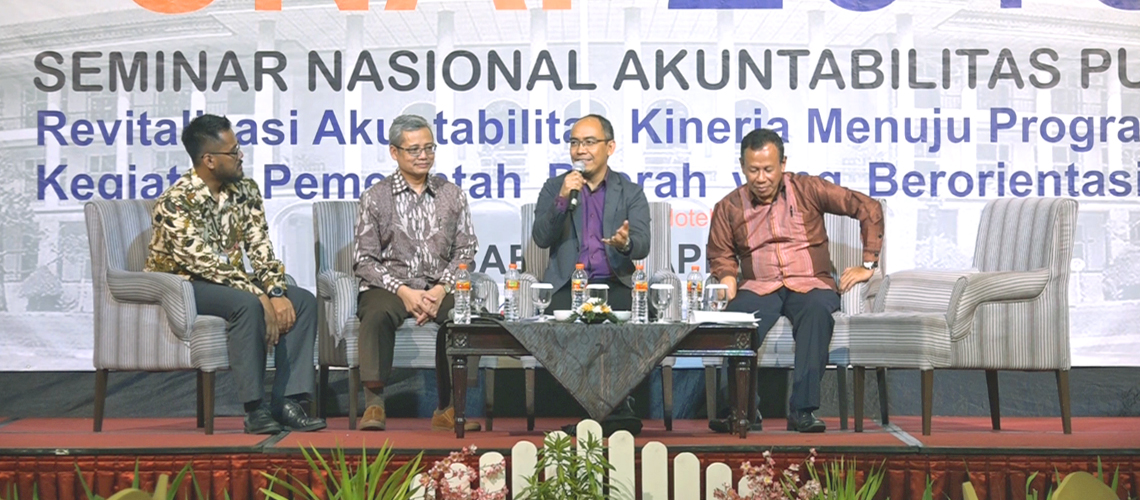Public Sector Governance (PSG) Faculty of Economics and Business UGM held National Seminar on Public Accountability (SNAP) 2018 on Saturday (7/4) at Ballroom of The Sahid Rich Hotel Yogyakarta. The participants were enthused from the beginning to the end of the event. More than 300 participants varies from civil servant, intellectual and students were present in SNAP 2018. This activity is supported by IAI, BPKP, STAR (State Accountability Revitalization), ADB, Sleman District Government, and PSG.
The first ever SNAP highlighted topic about revitalizing performance accountability and providing programs and results-oriented activities conducted by district government. We can see by the phenomenon which occurred in Indonesia today, the practice of performance accountability that has not been implemented as a whole. Inspection and supervisory agencies still emphasize financial accountability as a measure of accountability from public organizations. The Indonesian government should continue to seek performance based budgeting as a basis.
Dr. Eko Suwardi, M.Sc. as the dean of FEB UGM in his speech revealed the seminar is was a real life implementation from one accounting laboratory, that is PSG.
"PSG is one of the public sector activities contains within the accounting department, so this is part of the accounting lab. This is also an actual activity in the accounting lab especially for public sector involving many parties, students, lecturers, community and also local and central government, "he said,
UGM Rector Prof. Ir. Panut Mulyono, M. Eng., D.Eng. inaugurate SNAP 2018 with his speech. In his speech, he said that SNAP 2018 expected to help provide an overview in fund management.
"With this seminar, activities related to the use of funds that must be accountable to the public can deliver the results, outputs, and outcomes as we all expected," he explained.
He added that budgeting requires clarity and measurement for organizational performance information of previous periods.
"The clarity and measurement of performance information is a pillar of performance accountability. The achievement of program targets and usefulness is a benchmark in performance-based budgeting, "he added.
SNAP 2018 was divided into two sessions. The first session, were about planning, budgeting, and performance management discussion. In the first session, the moderator was Rusdi Akbar, M.Sc., Ph.D., CMA and it was attended by three speakers, Kunta W.D. Nugraha as Director of APBN Budgetary Directorate General of Budget explaining about performance-based budgeting practices in Indonesia. Furthermore, the exposure related to the implementation of performance management in local government submitted by Subagyo, S. Sos, M. Si. as Head of Sub Directorate of Information System and Technical Support of Implementation of Regional Budget-KEMENDAGRI. Finally, Choirul Anam from the Ministry of Administrative Reform and Bureaucratic Reform presents the embodiment of accountable, effective, and efficient bureaucracy.
The discussion session gets more and more interesting on the second session, it was about the accountability of local government performance. The four speakers were Yusnadewi, S.E., M.Si., Ak. as Head of BPK DIY Representative, Drs. Gatot Darmasto, MBA., Ak., CRMA., CA., CfrA as Deputy for Supervision of Regional Finance Administration of BPK, Ir. Sri Nurkyatsiwi., M.M from BAPPEDA DIY, and Drs. H. Sri Purnomo, M.Si. as the Sleman Regent.
In addition to seminars, this event has also been conducted launching Journal of Accounting & Public Accountability (JAAP). One of the participants of the seminar Doddy Bagus Jatmiko from DPPAK Pemda DIY revealed, SNAP 2018 needs to be an annual agenda so that in the future the performance audit can bring maximum impact on regional development.
"I hope UGM can provide better facilities for local governments to learn more about performance audit so that in the future the audit results can have a real impact for the institution and society in general," he explained.
Source: Mey
